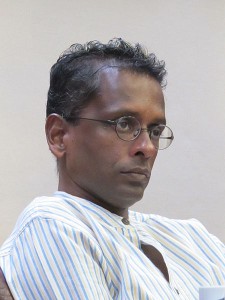“The magic of fiction seems to be the more specific you are, the more universal you end up becoming.” – Shyam Selvadurai, in an Outlines Interview, May 1996.
Biography

If postcolonialism is the Empire writing back, many Sri Lankans have had to write back to an Empire in which they now reside. Emigrating to the United Kingdom, Canada, or the United States to escape the political, religious, and racial violence that has consumed their home country, expatriate Sri Lankans such as Michael Ondaatje and Romesh Gunesekera have carved out respected positions for themselves within the world of letters. Newcomer Shyam Selvadurai’s first novel, Funny Boy, has established him as a talent deserving a place next to some more well-known Sri Lankan expatriates.
Born in 1965 in Colombo, Sri Lanka, Selvadurai’s mixed Tamil/Sinhalese family emigrated to Canada in 1983. While in Canada, Selvadurai came to terms with his homosexuality, and studied at York University. His first novel, Funny Boy was published in 1994. He currently lives in Toronto with his partner Andrew Champion.
Funny Boy
Funny Boy could be read as a bildungsroman, the story of one young boy’s interior formation and integration, set against the backdrop of his country’s disintegration. The boy, Arjun “Arjie” Chelvaratnam, is the second son of a privileged middle-class Tamil family. It is amid rising waves of Sinhalese and Tamil violence that Arjie must understand and come to terms with his own homosexuality. Coming out is no small feat for any gay teen to undertake, and on top of the usual feelings of loneliness, isolation, and fear of rejection by family and friends, Arjie must negotiate his painful transformation to adulthood in the midst of a country gone mad.
It is the socio-economic, racial, and religious tensions within Sri Lanka that occupy most of Selvadurai (and consequently Arjie’s) time and attention within the novel. In fact, while Arjie’s awakening sexuality serves as an undercurrent throughout the book’s five sections (plus an epilogue) it is really only the main theme of one, “The Best School of All.” That is the section in which Arjie’s father sends him to The Queen Victoria Academy, a terribly cruel English-style school.
The Queen Victoria Academy serves as a symbol for colonial, aristocratic, and middle class male privilege. This is the tradition Arjie is expected to be a part of. To be gay would, for Arjie, mean failing in the eyes of his Father and the larger world of middle class Tamil patriarchy in which he lives. Indeed, Arjie’s father tells him that the academy “will force you to become a man,” clearly indicating that the school is to indoctrinate Arjie in the ways of middle class male privilege. Arjie’s older brother warns him that their Father suspects and fears his homosexuality. His move to the Academy is clearly meant to “cure” him of (what his Father sees as) the homosexual affliction. Within this context, it is extremely ironic that the Academy is the very place in which Arjie meets Shehan Soyza, a Sinhalese classmate whom he falls for and carries on a sexual relationship with.
The five sections of the novel and its epilogue could each be read as lengthy short stories or novellas in their own right. “Pigs Can’t Fly” examines Arjie’s early childhood and his gravitation towards the imaginative games his female cousins play as opposed to his male cousins’ beloved game of cricket. The section concerns cultural constructions of gender and the negative developmental effects incurred by one who naturally falls outside of said constructions. “Radha Aunty” is the tale of Arjie’s Aunt Radha and her doomed affair with a Sinhalese man. It foreshadows some of the conflicts Arjie is to face in his own relationship with Shehan. In “See No Evil, Hear No Evil,” Arjie plays an important role in his mother’s extramarital affair with a childhood sweetheart. This is his introduction into the world of covert or secret relationships between adults and the prices anyone may pay for loving the “wrong” kind of person. “Small Choices” chronicles one of Arjie’s first crushes, a puppy love obsession with a young man employed by his father, while the novel’s epilogue “Riot Journal” is Arjie’s frightening first hand account of anti-Tamil violence. The book ends with the family’s imminent emigration to Canada.
In an interview, when the question of autobiography was raised, Selvadurai had this to say: “I’m gay and Arjie’s gay and both families left Sri Lanka, but that’s where it ends. Arjie’s first experience and acceptance of himself happened in Sri Lanka and mine happened in Canada. My family is also much more liberal. My father is Sinhalese and my mother is Tamil which was a huge thing at the time of their marriage so we were brought up differently from other kids. There was a lot of tolerance for difference.”
Awards and Honors
Funny Boy won the Lambda Literary Foundation’s Award for Best Gay Male Novel as well as the Smithbooks/Books in Canada First Novel Award for 1994. Selvadurai’s young adult novel Swimming in the Monsoon Sea (2005) won the Lambda Literary Award in the children’s and youth literature category.
Author Bibliography
- Cinnamon Gardens. Toronto: McClelland and Stewart, 1998.
- Funny Boy. San Diego: Harvest Books, Harcourt Brace & Company, 1994.
- The Hungry Ghosts. Toronto: Doubleday Canada, 2013
- Swimming in the Monsoon Sea. Toronto: Tundra, 2005.
- Story-Wallah: Short Fiction from South Asian Writers. New York: Houghton Mifflin, 2005.
Works Cited
- “The Breach: Three Sri Lankan-Born Writers at the Crossroads.” Outlook: The Weekly News Magazine 5 Nov 1997.
- Keehnen, Owen. “Sri Lankan Author Shyam Selvadurai’s A ‘Funny Boy.’”(May 1996) Outlines: The Voice of The Gay and Lesbian Community. Nov. 5, 1997. Web.
Related Sites
Homophobia and Postcolonialism
https://scholarblogs.emory.edu/postcolonialstudies/2014/06/20/homophobia-and-postcolonialism/
The Politics of Sri Lanka and Reef
https://scholarblogs.emory.edu/postcolonialstudies/2014/06/10/gunesekera-romesh/
Author: Harry Thomas, Fall 1997
Last edited: May 2017